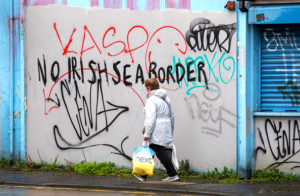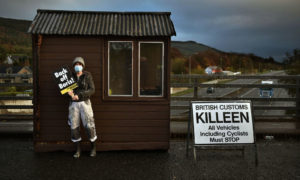Brexit was predicted to be baleful for Ireland. Remember Bertie Ahearn and Tony Blair declaring that if there were a land border between the UK and Ireland, there would be a bit of a problem? “Oh experts, give over,” the other side chorused, “Give up your tedious doom-mongering, it’ll be grand don’t you know!”
The DUP, who were especially enthusiastic for Brexit, were among those who shouted loudest. They even got a lot of money from somewhere to put a pro-Brexit ad in Metro, which some said was a tad fishy. The DUP pushed back: it was a UK-wide election so they were entitled to place ads in paper that’s not distributed in Northern Ireland. When asked, they refused to say where the money came from.
After the Brexiteers’ triumph, years of negotiation between the UK and EU revealed, as predicted, that a “new” border on the island of Ireland would be a bit of a problem. Reports of the endless wrangles clogged the airwaves and made not a few, certainly in England, just wish the Irish problem could be sorted, so the poor old UK, God bless her, could just move on! Ah, moving on: the catchphrase of those rank with self-pity when they have to deal with the consequences of their actions.
In Ireland we didn’t have that luxury. We knew the problem wouldn’t go away. Even members of the DUP knew that. Their solution — and once you know this was always their goal, then everything they’ve done vis-à-vis Brexit makes complete sense — was the restoration of the old border, the one established post-partition in 1922; the one that lasted until 1998, when the Good Friday Agreement stripped it of its check points and watchtowers.
This border was not a rip-roaring success, yet this was what the DUP and the European Research Group stalwarts wanted back. If you don’t believe me, check out Liam Fox on BBC R4 on 1 January 2022: in an interview he stated that Brexit restored the UK’s control over its borders and, as a newly sovereign state, the UK could and should re-establish the Irish border.
Not everyone here in Northern Ireland, of course, is singing from the DUP hymn sheet. For this is still nominally a democracy. And the Brexit vote was not a sectarian matter: a straightforward case of Unionists voting Leave and Nationalists voting Remain. Many progressive Unionists voted Remain because they saw their future in Europe. And there were certainly some Catholics and Nationalists who reckoned they were better off cleaving to the devil they knew, perfidious Albion, rather than throwing their lot in with the pesky Europeans.
But post-2016, as the wrangles rumbled on — as the bitterness between the UK and Europe deepened and hardened; as Mrs May’s government floundered; and as the DUP, boosted by supplying the Tories with a coalition of sorts after the disastrous 2017 election, strutted their stuff and talked up the hardest of Hard Brexits — one began to notice something unexpected in Ireland. Since the referendum, EU membership had become a sectarian matter. Generally speaking, Catholics, Republicans and Nationalists favoured Europe; Protestants, Unionists and Loyalists did not. This is the crucial context of the Stormont Assembly election, on Thursday.
Northern Ireland was designed so that there would always be a Unionist majority. But for various reasons, that majority has been declining. There are now more non-unionists than Unionists in Stormont. But the DUP is still the largest party, so it was from their ranks that the last First Minister came, while the deputy First Minister came from Sinn Fein’s ranks.
The roles of First and deputy First Minister have equal heft, but in the DUP’s eyes their candidate being the ‘First Minister’ re-asserts and anneals what they need to believe. They are the top dog: the natural party of government in Northern Ireland. But now, it appears (if the polls are to be trusted) that Sinn Fein are about to become the biggest party in Stormont. A Sinn Fein candidate (probably Michelle O’Neill) will likely be First Minister.
And though that may be bad, a Sinner First Minister, what’s worse is what comes next. Sinn Fein obviously want a border poll: they are committed to Irish Unity and a border poll is the only way to make their wish come true. A poll is entirely in the Secretary of State’s gift; might the obdurate Tory Brandon Lewis grant Sinn Fein their wish, if they have a First Minister in place? The signals coming from the Tories suggest not, but we all know (the polls again confirm this) that many Tories would love to be free of the albatross of Ulster. And if the poll is granted — and it’s a big if — then the Brexit farrago really comes into own.
Those who don’t want unity will trot out the old arguments. Irish government bad, British government good; Irish health service bad, NHS good; Dáil Éireann bad, Westminster, the mother of Parliaments, good. They will also play the Brexit card: “Look at the division it’s caused, let’s not repeat the mistake.” Covid will be referenced, too. “Look how the four home nations stood shoulder to shoulder to defeat the coronavirus,” the Unionists will chorus.
And the pro-Irish Unity arguments? The unity case, traditionally, was always all about repairing an ancient wound, restoring a damaged island to its healthy whole. But post-Brexit, the argument Sinn Fein and the nationalists are going to mount won’t be the old one about gluing two bits of a broken place back together. They will dwell on the fact that, in the event of unity, Northern Ireland will be re-joining Europe. Remember: we voted by a clear majority to stay in Europe in the 2016 referendum.
Our politics may not be totally binary, yet, but as an argument to get people (especially the undecided and the unsure) to put their X beside “Yes” on a unity poll ballot paper, the idea that a United Ireland means forward into Europe looks pretty good. The other side’s vision of a future still shackled to the UK, and the Tories and Johnson, out of Europe, doesn’t look quite so hot. The Sinn Fein case certainly looks better to me, at least.
Still, with Republicans (at this moment of writing) my conversations are muted, at least on their side. It is patently obvious they’re incredibly anxious not to be seen as being triumphalist. They are within touching distance of a border poll and must not let the opposition see how pleased they are.
But they are very pleased. Last time there was a border poll, in the Seventies, it was a boycotted by nationalists and Republicans, who argued there was no point participating in such a poll when Northern Ireland was an artificially created state with a Protestant majority. However, next time will be different. Next time there will be no boycott. Republican organisations will present a united front, working together to achieve their goal. And they have precedent here: when that side of the house pulls together, they can achieve miracles, like the election of Bobby Sands.
Everyone here knows that Blighty is a fickle lover — and that there is a strong constituency in Britain that would be more than happy to slough off Northern Ireland. It demoralises Unionists, and that therefore helps the United Irelanders in turn. But at the same time, counter-intuitively, the Tory government is introducing legislation that will reinforce the border and Northern Ireland’s place within the United Kingdom: yes, coming down the track there is a new law that will require all EU citizens barring Irish ones to have an ESTA before they enter Northern Ireland from Ireland. If they enter Northern Ireland from Ireland without an ESTA and they are caught, the punishment is four years in jail. This, too, empowers Republicans.
When I talk to nationalists (some of whom, like me, are considering voting for the SDLP this Thursday) about the future and what might happen in the event of the unity poll, what I meet is concern. They are worried about how this is going to play with unionists and loyalists and Protestants. They want a united Ireland, yes, but they also want to find some way of doing this that will not terrify the people with whom they share this place. They want evolution rather than revolution.
Seamus Mallon was one of the great articulators of this strand of thinking: his idea that one has to treat the “other” side with tact and care and sympathy has strong support. Those who vote for the Alliance Party (middle-class people like me; I have voted for them in the past) also believe in this idea strongly but are uncertain about how and if unity will work in practice. Alliance used to be a moderately unionist party, but now positions itself as on neither side of the fence. I don’t know if Alliance supports a United Ireland in theory and I live here and that’s the problem.
I don’t blame Alliance, though. A lot of progressive or liberal Unionists vote for them and too much talk of unity might put those people off. They might be driven into the arms of the Ulster Unionists or the DUP or the TUV, the really hardcore Unionist party who are busily stealing the DUPs clothes and snapping at the heels and fraying their vote.
When I talk to unionists and loyalists, especially of the pro-Brexit variety, what I meet is anxiety. They know the English, or the British, are not constant and committed. They know the Republicans have the capacity to mount an effective campaign in a unity poll, underpinned by a positive story about rejoining Europe and marching into a glorious future of lovely coffee houses and trams in every city centre.
What is notable, at least to me, is how their rhetoric has changed in step with changing circumstances. In the olden days, the pro-Union arguments relied on such old favourites as, for instance, the appalling roads in the south and the poor nature of Irish governance. In the 21st century, this won’t wash anymore. The roads in the south (largely thanks to EU money) are actually better and less potholed than roads in the North and Irish governance is formidable. The Irish health service didn’t do too badly during the Covid pandemic, which is something many in the North, where the NHS is a shibboleth, are chary of admitting.
The new anti-unity rhetoric, which I hear coming from unionists and loyalists, is all about Europe. The EU is now categorised as an enemy who wants to swallow us up using the Irish Protocol (which allows Northern Ireland to remain in the single market though the UK is out of the EU) as it’s Trojan horse. When I hear this kind of talk I find myself wondering if I’m back in the 18th century, only instead of Louis XVI, the enemy is now Ursula von Der Leyen; but then as we often say in Ireland, “To hell with the future, let’s get on with the past.”
Unionists have another fear. Even if the Republicans lose the unity poll, should they get one, they will have no truck with the idea of it being a once-in-a-lifetime poll, just as Scottish Nationalists won’t accept that their 2014 referendum was a one-off. If there is an Irish unity poll and it is lost, it will be followed by another poll a few years later, and then another poll a few years later again, until the right result is delivered.
Yes, this is what those who wish to maintain the union believe is the future. They’re frightened, and frightened people are apt to agitate and push for things that are reckless. And so, among some unionists and most loyalists, there is fidelity to the crackpot idea that the United Kingdom should trigger Article 16 and junk the Irish Sea Protocol and just put the border back where it always was.
Even if the Tories secretly wish to jettison Northern Ireland, they might do this, if they thought it would be to their advantage. We do seem to live in an age when the world is upside down and in which rulers appear to have little or no compunction about upsetting the applecart and making a bad situation worse. Meaning that everyone in Ireland — from quietly confident republicans to extremely anxious unionists — is afraid that something is coming, after Thursday’s election, that they aren’t going to like.
Disclaimer
Some of the posts we share are controversial and we do not necessarily agree with them in the whole extend. Sometimes we agree with the content or part of it but we do not agree with the narration or language. Nevertheless we find them somehow interesting, valuable and/or informative or we share them, because we strongly believe in freedom of speech, free press and journalism. We strongly encourage you to have a critical approach to all the content, do your own research and analysis to build your own opinion.
We would be glad to have your feedback.
Source: UnHerd Read the original article here: https://unherd.com






